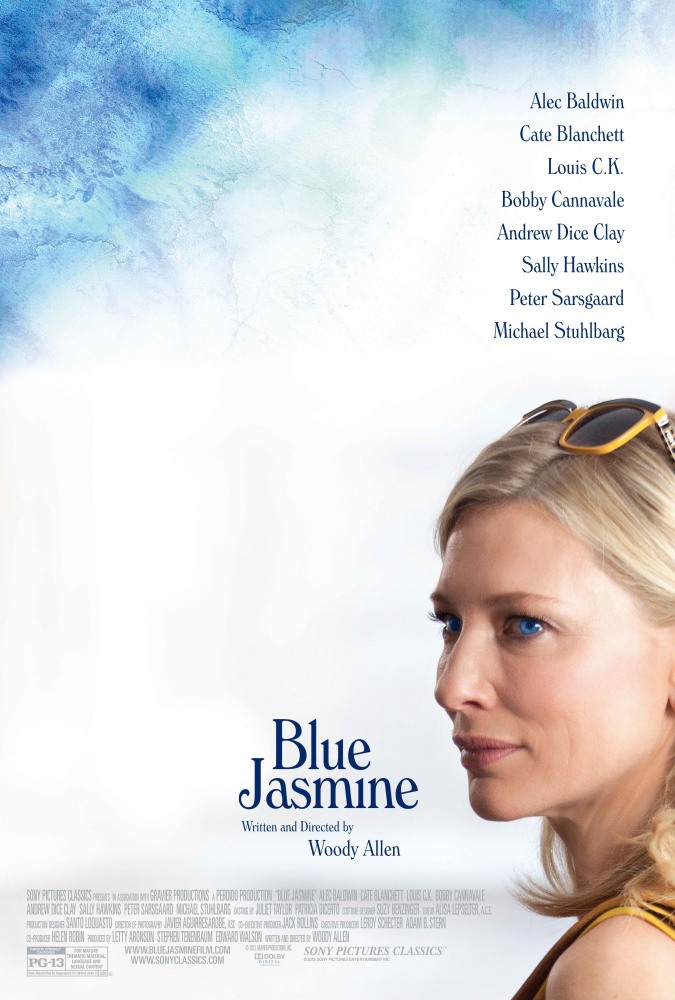Blue Jasmine
 Blue Jasmine Directed by: Woody Allen Cast: Cate Blanchett, Sally Hawkins, Louis C.K., Andrew Dice Clay, Michael Stuhlbarg Running Time: 1 hr 38 mins Rating: PG-13 Release Date: August 2, 2013 (Chicago)
Blue Jasmine Directed by: Woody Allen Cast: Cate Blanchett, Sally Hawkins, Louis C.K., Andrew Dice Clay, Michael Stuhlbarg Running Time: 1 hr 38 mins Rating: PG-13 Release Date: August 2, 2013 (Chicago)
PLOT: A woman on the verge of a nervous breakdown (Blanchett) moves in with her sister (Hawkins) after losing everything.
WHO'S IT FOR? Fans of Woody Allen certainly, or anyone who likes a dark rumination on the upper class every now and then.
OVERALL
With other human beings often used by his lead characters like objects, affairs sending one character onto their partner, Woody Allen movies have constantly been fascinated with the restless of wanting more from what gives us pleasure. Why focus on one person or thing that will please us, if said happiness can also be found in another form? Such is the contemplation that has shown the ruin of many of his romantic tragic characters of past, regardless of how intellectual they claim to be.
Blue Jasmine, Woody Allen's own take on the recent American dream discussions previously had by Pain & Gain and The Bling Ring, focuses that nagging feeling about people toward a post-recession story on actual property, and the greediness that keeps people from being grounded in the more irreplaceable, and truer joys of life.
The film is lead with nutty grandiosity by Cate Blanchett, in a role that's another testament to her control over a character regardless of the wide space that she must bounce between. Unlike Kristen Scott Thomas' similar appearance in Only God Forgives, Blanchett's representation of a typical blonde middle-aged upper class woman does not come off like caricature. Despite the obviousness on her surface, Blanchett constantly keeps this character an intriguing mystery, especially as she continues to hollow herself out by not accepting her dosages of reality. In a history of impressive female characters from Allen's screenplays, Blanchett's Jasmine is yet another accomplishment.
Working this parable into his wheelhouse of economic class clashing, Allen fills this script with broadly painted characters, enlivened by compelling casting. Mysteriously cast in the same film but playing against expectation, comedians Louis C.K. and Andrew Dice Clay are strikingly humble as their dejected male characters, each of which get to work directly opposite the delightful Sally Hawkins. While C.K. is cute with his cheesy impromptu moments of romance, Dice Clay is able to convey something more sensitive despite his burly exterior.
Michael Stuhlbarg must have the exact opposite career trajectory of most other actors. He started at the top with a great lead role in A Serious Man, but has now found himself in numerous nebbish supporting roles, his goofy dentist in Blue Jasmine no exception. His character's inclusion to this story might seem a bit necessary (do we need another physical example of how Jasmine always sees class?) but Stuhlbarg makes his moments work with the type of pathetic humor intended.
In the scope of Allen's most recent work, Blue Jasmine stands as something more important than his nostalgic vacations such as Midnight in Paris or From Rome with Love. His best since 2008's Vicky Christina Barcelona, this movie also features glitches in his assembly line form of filmmaking, which chip away further at this script's imperfection. Some chunks of this movie feel overlong, and a scene in which Jasmine confesses to young children as if they were adult shrinks is easy comedy a maestro like Allen should be above. One could even nitpick about the incredibly cheap establishing plane shot that literally sank my heart momentarily just moments after the opening credits, but, eh.
Bathed in the common golden hue seen in his most recent movies, Blue Jasmine is a film that spins within the writer/director's safer zone, but despite its darker psychological tragedy remains to be a potent romantic statement. His previous films from even a decade ago toy with the question of whether concepts like monogamy are really worth it, but as he reaches the twilight of his filmmaking career, returning after many decades to the Play It Again, Sam location of San Francisco, he seems to be more confident in the answer he has found. By using the descent of Blanchett's materialistic martyr as a strong example, Blue Jasmine is a sincere, lasting warning to put value in life's most significant of non-guaranteed pleasures.
FINAL SCORE: 7/10